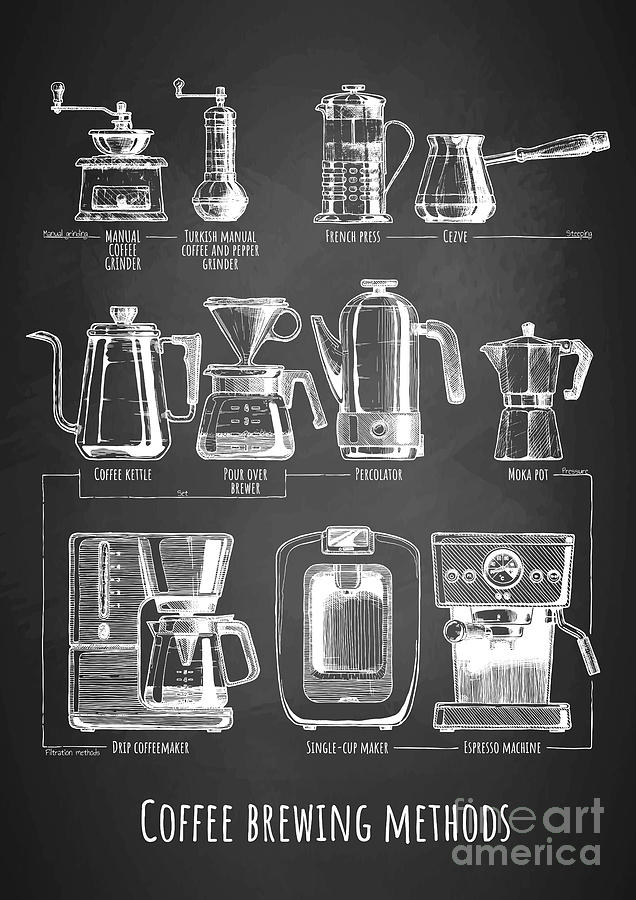Discovering the Art of Coffee Brewing Methods: Tips for Every Enthusiast
Discovering the Art of Coffee Brewing Methods: Tips for Every Enthusiast
Blog Article
The Science Behind Coffee Brewing: How Temperature Level and Time Affect Your Beverage
Understanding the science behind coffee developing discloses that temperature level and time are not plain variables however pivotal components that dictate the beverage's flavor profile and general quality. The optimal brewing temperature level generally drops in between 195 ° F and 205 ° F, while the period of removal differs considerably throughout various methods. This interplay of variables can lead to a mug that is either frustrating or delightful. As we discover the nuances of these aspects, the inquiry occurs: just how can one properly equilibrium temperature level and time to attain that perfect mixture?
The Chemistry of Coffee Extraction
The chemistry of coffee extraction explores the complex processes that transform raw coffee beans right into the aromatic drink taken pleasure in worldwide. This transformation primarily includes the solubility of various compounds existing in the beans, which are influenced by factors such as work size, water top quality, and the brewing approach utilized.
During the developing process, hot water serves as a solvent, drawing out soluble substances, including caffeine, sugars, acids, and lipids, from the coffee grounds. Each substance contributes to the taste profile, fragrance, and body of the last beverage. Acids are accountable for appetizing and intense notes, while oils add to an abundant mouthfeel.
The extraction procedure is not consistent; different compounds dissolve at different rates. The first stages of brewing essence acids and sugars, bring about a pleasurable level of acidity, while prolonged extraction can cause anger due to over-extraction of undesirable substances. Understanding these chemical interactions is critical for optimizing brewing techniques, as the balance between extraction time and water temperature level can dramatically affect the overall quality of the coffee. Ultimately, mastering the chemistry of coffee extraction is essential to attaining a tasty and well-rounded cup.
Suitable Brewing Temperatures
Locating the ideal brewing temperature is essential for opening the full potential of coffee tastes and scents - coffee brewing methods. Research study suggests that the optimum variety for brewing coffee exists between 195 ° F to 205 ° F(90 ° C to 96 ° C) Within this range, the removal process effectively liquifies the desirable soluble substances in coffee beans, causing a savory and balanced mug
Brewing at reduced temperature levels, such as below 195 ° F(90 ° C ), might result in under-extraction, generating a weak and acidic brew with low-key flavors. Alternatively, brewing at temperature levels exceeding 205 ° F(96 ° C) can bring about over-extraction, creating a rough and bitter taste because of the too much dissolution of unfavorable compounds, such as tannins.
Additionally, the optimal developing temperature can vary depending on the coffee bean kind and roast degree. Lighter roasts commonly benefit from somewhat higher temperature levels to enhance their intricate flavor profiles, while darker roasts might be much better suited to lower temperature levels to minimize bitterness.
Eventually, keeping accuracy in developing temperature levels is crucial for achieving a harmonious balance of flavors, making certain that every cup of coffee delivers a satisfying sensory experience.
Impact of Brewing Time
Brewing time plays a critical function in figuring out the flavor profile and overall quality of coffee. The extraction procedure, which affects the preference, scent, and body of the beverage, is mostly depending on the length of time the coffee grounds are in contact with water. Shorter developing times can result in under-extraction, bring about a weak or sour flavor, as not nearly enough soluble compounds are dissolved. Conversely, long term developing can cause over-extraction, where unfavorable compounds are released, resulting in an astringent or bitter preference.
Ideal developing time differs depending on the approach utilized and the work dimension of the coffee. A French press normally needs concerning 4 mins, while espresso extraction is generally finished within 25 to 30 secs. It is necessary to adjust developing time in conjunction with other variables, such as water temperature and coffee-to-water ratio, to attain the wanted flavor account.
Recognizing the effect of developing time allows coffee fanatics to refine their developing techniques, ultimately enhancing the sensory experience of their mug (coffee brewing methods). With cautious focus to this variable, one can unlock the full capacity of the coffee, exposing its one-of-a-kind attributes and subtleties
Brewing Techniques and Their Results

For instance, techniques like French press and chilly mixture permit a longer steeping time, resulting in a fuller body and robust taste due to increased extraction of oils and soluble solids. Alternatively, coffee developing uses high stress and a much shorter extraction time, generating a focused shot that highlights extreme flavors and a rich crema.
Pour-over techniques, such as Chemex or V60, use an even more controlled extraction process, allowing the maker to you can find out more adjust flow rate and water distribution, which can enhance illumination and quality. Percolation methods cycle water through the coffee grounds numerous times, leading to a more powerful, typically bitter flavor.
Lastly, making use of paper filters versus metal filters can also influence the final taste; paper filters typically produce a cleaner cup by capturing oils and great particles, while steel filters enable more visit the site oils to pass through, adding to a fuller mouthfeel - coffee brewing methods. Comprehending these subtleties can raise the coffee experience considerably
Tips for Refining Your Mixture
A well-executed mixture can transform also the simplest coffee right into an exceptional experience. Grind the beans just before brewing to maximize freshness, ensuring the grind dimension matches your brewing technique-- coarser for French press and finer for coffee.
Water quality plays an important duty; use filtered water free from pollutants. The excellent brewing temperature level ranges between 195 ° F and 205 ° F(90 ° C to 96 ° C ) As well warm can scorch the coffee, while as well trendy may under-extract tastes.
Timing is just as important. For immersion techniques, soaking for 3 to five mins is optimum, whereas drip methods normally take about 5 minutes. Try out mixture times to locate your preferred strength.

Verdict
In recap, the complex relationship in between temperature and time is paramount in the coffee brewing procedure. Comprehending these clinical concepts empowers individuals to refine their developing methods, inevitably leading to a much more this hyperlink pleasurable and well balanced coffee experience.
Recognizing the science behind coffee developing exposes that temperature and time are not plain variables however pivotal aspects that dictate the beverage's flavor account and general quality. Comprehending these chemical interactions is critical for enhancing developing methods, as the equilibrium between removal time and water temperature level can considerably affect the overall top quality of the coffee.Brewing time plays an essential role in figuring out the flavor account and general quality of coffee. By concentrating on these components-- bean quality, grind dimension, water temperature level, steeping time, and proportion-- you can boost your coffee brewing procedure, resulting in a constantly remarkable cup.
In recap, the detailed relationship in between temperature level and time is critical in the coffee brewing procedure.
Report this page